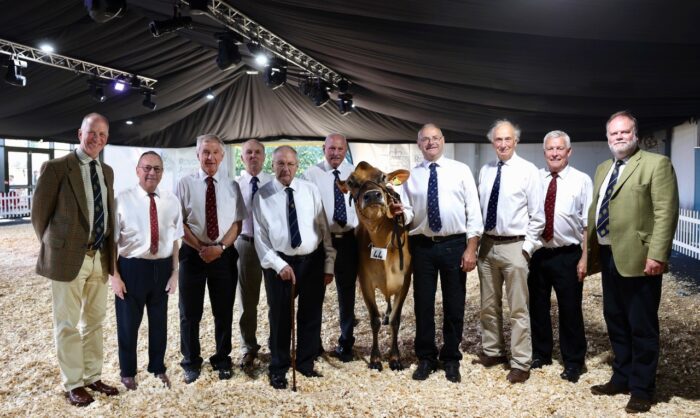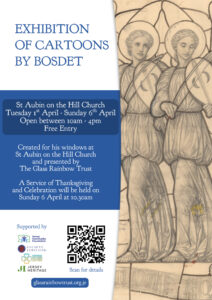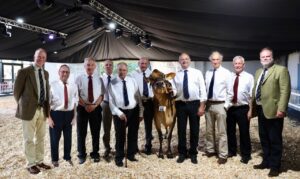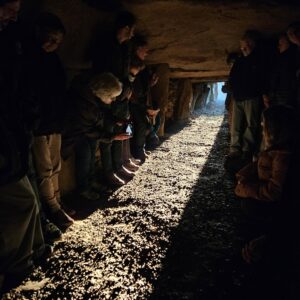
CHARLES LE CORNU, who has died aged 84, was a past president of the Royal Jersey Agricultural and Horticultural Society, a successful dairy farmer and respected cattle breeder.
It has been said of him that a knowledge of showing cattle and displaying them was bred into his veins. In the course of his career he travelled to many parts of the world in connection with the Jersey cow, and established a reputation for himself as an international show judge.
In addition, he was an excellent horseman, and his other passion and love was a love of working with horses, riding and driving. He recalled that as a small child, when it was time for him to return home from the fields, his parents would stick him on top of the farm horse, and leave the horse to find its way back home – there was less traffic in the country parishes in those days. He hunted with the Jersey Drag Hunt, and later was involved in horse driving activities, often using one of his carriages to drive a bride to and from church on her wedding day.
In his home parish of St Lawrence, he was brought up as a Methodist, but later worshipped at St Lawrence Parish Church, where he was a churchwarden for many years, and a well-known and much-loved parishioner. For many years the Christmas crib services were held at his farm. He was president of the St Lawrence Agricultural Society, and was often approached to stand for the senior offices in the parish, but always declined to do so, because of his commitment to the RJA&HS.
Quintessentially, he was a countryman who believed strongly in traditional values — his farm and farm buildings were always immaculately maintained, and the same could be said for his own personal and sartorial standards, which were much at odds with modern trends of casualness and informality in public life.
Mr Le Cornu’s family farmed at Six Roads Farm, near Carrefour Selous in St Lawrence, for over a century, and over three generations. His father, Snowden Le Cornu, was a good judge of the Jersey breed and would buy in cattle that he could then sell on to foreign buyers.
It was not a large herd – 40 -50 head of cattle, including 15 to 20 cows. But in his youth, that was considered to be a fair-sized herd, and it was known to be a top-quality herd. The family concentrated on the breeding of cattle and the cattle export trade. This was at a time, in the mid to late 1950s, that there were 50 to 60 herds in St Lawerence alone; the parish had its own Agricultural Society with cattle shows, held at the Arsenal behind the Parish Hall.
He was a very active child and was interested in farming from a young age; at the age of four, his father cut down the legs of a milking stool so that he could milk cows. By the time he was aged 14, he would cycle along to the open space that was outside the Carrefour Selous Hotel (now the Carrefour gym) to view the cattle taking their ‘herd book exams’ and report back to his father on likely cows for purchasing.
His first contribution to public life was as vice-chairman with the Jersey Young Farmers Club. His association with the Young Farmers carried on throughout his lifetime, and he always remained an elected member of the club’s advisory body.
Together with fellow young farmers Lewis Rondel and John Le Feuvre, he represented the Island at the junior section cattle judging competition at the London Dairy Show for three consecutive years, displaying a natural gift for showing and judging the Jersey breed.
At the time, in the mid to late 1950s, there were still over 1,000 farming units in the Island. He recalled with nostalgic affection: ‘Looking back, I think of the farms, and the smallholdings, but they were quality holdings, and people took so much pride in them and had such a lovely, unpressurised life. They went into farming because it was a good living for them; they ate well, there was plenty of time for one another, and the farming community was mutually supportive. There were so many aspects of community and friendship.’
He was 20 years old when he accompanied a shipment of 11 head of cattle from the Island to South Africa. The voyage lasted 29 days on board the ship and he had to milk the six cows by hand. He reflected that he didn’t realise beforehand what he was letting himself in for. He recalled that the first week on board ship, he felt both homesick and seasick, but things improved, especially as the milk from the cows was much appreciated by the captain and crew members. It was his first visit to South Africa: he was due to stay there for one month but stayed for six. It was a country that he loved and to which he returned many times in the course of subsequent years.
His life was dedicated to the Jersey cow. In his own words: ‘Our herd was always a shop window, and the cattle were always immaculately looked after; the tails were washed every morning. They all wore hessian bags around their bodies. My Dad and I looked after those cows. It was a terrific herd that we had. Our lives were totally dominated by them. The cows were not only our bread and butter; they were our life, our hobby and our pleasure.’
Charles Philip Le Cornu was born in November 1940, the second child of Snowdon Le Cornu and Elsie (née Bichard).
He was educated at Helvetia High School and then at Victoria College, where he excelled at sports, especially football, representing and captaining various age group teams. Football was a love that followed him throughout his lifetime, and he remained a staunch supporter of Manchester United. A keen member of the CCF, he had thoughts of a military career, but when he left school at 16, he was encouraged to join his father on the family farm. By the November of his school-leaving year he was on the committee of the St Lawrence Agricultural Society.
He first judged an Island cattle show at the age of 19, and was on the Council of the RJA&HS in his early 20s. He became vice-president of the Agricultural Section of the society at the age of 33 and president in 1989, following the early death of the previous president, Phil Romeril. He was very much involved in the hard negotiations to sell to the States the society’s Springfield site; the negotiations were concluded by his successor as president, John Le Feuvre.
He had to endure the debilitating effects of Parkinson’s Disease, which he bore with great fortitude.
In recent years, he would have a weekly meeting with three long-term friends from the world of Jersey cattle, John Le Feuvre, Lewis Rondel and Derrick Frigot, for a trip to view herds, talk cows and enjoy a convivial lunch, in what has been described affectionately as ‘Jersey’s equivalent to the Last of the Summer Wine.’
Mr Le Cornu had a lifelong love of sports, especially football, cricket and athletics, both local and global. He has been described as logical, fair, respectful and determined, but that dealing with people was second nature to him, and he was always welcoming and interested in others.
Summing up his philosophy of life, he wrote in his own autobiographical statement, ‘Memoirs of a Jersey Farmer’: ‘What has always been important in my life is being able to help family and friends and have good communication with people. I was always pleased when I could say “yes”. I could be relied on and people could trust my decision, I always enjoyed my social drink and appreciated a good partner to enjoy an evening of dancing.’
Mr Le Cornu is survived by his first wife, Norma (née Mourant); his second wife, Jane (née Battrick) predeceased him. From his first wife there were three daughters, Sharon, Melanie and Joanne, and grandchildren Charles and Victoria; RURAL magazine extends its sympathy to his family and to his many close friends and relations.
(Reprinted by kind permission of the Jersey Evening Post)




